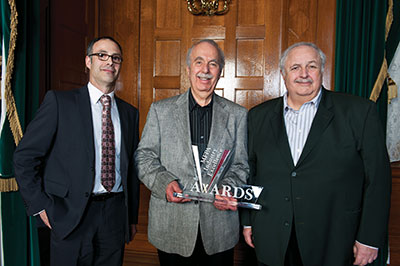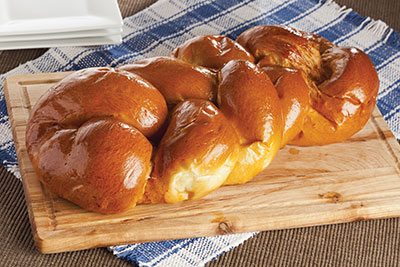
Baking kosher
February 18, 2014
By
Karly O'Brien
Arthur Gunn, co-owner and chief baker at Winnipeg’s Gunn’s Bakery, knows all of the ins and outs of kosher baking.
Arthur Gunn, co-owner and chief baker at Winnipeg’s Gunn’s Bakery, knows all of the ins and outs of kosher baking.
 |
|
| Dave Shambrock (on left) of the Manitoba Food Processors Association presented Bernie and Arthur Gunn (to the right) of Gunn’s Bakery with the 2012 Company of the Year award. Photo: Gunn’s Bakery |
The word kosher means to satisfy the requirements of the Jewish laws written in the Torah, which dictate how food is cooked, eaten and sold. Kosher requirements say that Jewish people can’t eat dairy and meat together. A practising Jewish person is required to have a waiting period, which can be as long as six hours, between the consumption of dairy (milchig) and meat (fleishig).
Because the bakery is fully certified as kosher, Gunn and his staff must be sure that all kosher milk products come from kosher animals and do not contain non-kosher additives. Milk products cannot contain meat products or derivatives (for example, various cheeses are manufactured with animal fats and this would not be allowed). Bread is not allowed to contain meat or dairy (pareve). Bread is without either because bread is a staple food in many Jewish households and usually paired with dairy or meat. The eggs of suitable birds like chickens, ducks and turkeys are permitted as long as they do not contain blood. Therefore, eggs must be individually examined.
This is just a fraction of what a kosher bakery is required to do. Two of every tool, such as scissors, slicers, bowls and boards, are needed and kept separately. Each culinary device is colour coded to indicate which can be used to create dairy and non-dairy baked goods. The product showcase teasing customers with mouthwatering creations separates the dairy from the non-dairy.
To adhere to these rules, Gunn’s Bakery purchases products that are certified by widely accepted kosher organizations. The most common certifying bodies that Gunn comes across are B.C. Kosher, Montreal Kosher and Kashruth Council of Canada. There are also other organizations that certify products as kosher, but it depends on where that supplier is located. A supplier in Toronto, for example, would use the Kashruth Council of Canada to certify the company’s products as kosher. On top of that, the bakery employs a rabbi who works for one of the certifying bodies. The rabbi will ensure that the bakery makes no mistake in cross-contaminating dairy with non-dairy and follows the rules that are set out in the Torah.
There are many specifications to producing kosher baked goods, but for Gunn’s Bakery, this is the day-to-day routine and a standard the bakery committed to when it first opened in 1937.
“I can tell you that if you were just starting out to be a kosher bakery it would be an astronomical headache for you,” says Gunn. “An expensive headache at that.”
His team of staff is a mix of Jewish and non-Jewish people, so kosher rules may be new to an employee who joins the company. Gunn tries to make it as easy as possible to learn so that his staff can focus on baking.
“I have to say that I am so proud of my staff here because it’s not a Jewish staff, but they adhere to the rules. It is unbelievable. If they are making something with dairy in it then they bring out the special tabletops and the special pans. If you go into the back, it is just seamless. It’s fantastic.”
Like his staff, he attracts a mix of Jewish and non-Jewish clientele.
“Some people come into our bakery and they have no idea what the word kosher even means,” says Gunn with a laugh.
When the bakery first opened, there was a large Jewish community in Winnipeg. Over time, the immigrants that resided in Winnipeg moved to southern Manitoba, Toronto and the United States.
In the last few years, the Jewish community has been revived with the arrival of hundreds of newcomers, especially from South American countries like Argentina, Brazil and Venezuela.
“We’ve actually had a large influx of Jewish people from South America. A lot of them have moved up here for better opportunities for their families and they have become a part of our community.”
How the bakery came to be
The family business began with his father, Morris, a baker’s son who immigrated to Canada from Poland in the mid-1920s. He started out as a baker at Buchwald’s Bakery, saving every penny until he could bring his sweetheart and soon-to-be wife, Florence Grodenczik, to Canada in 1930.
 |
|
| Challah is a loaf of white leavened bread that is traditionally used to celebrate the Jewish Sabbath (the one pictured above is not from the bakery). The bread is very popular at Gunn’s Bakery, which offers several varieties.
|
Seven years later, he started his own business – a one-man operation with a bakery storefront and his family living in the back quarters. At the time, he and his wife had a daughter, Betty, and a son, Bernie. Five years later, Gunn was born, and Morris’ business had outgrown the space. The family moved out of the bakery and moved the business to a new location just a few blocks from the previous location on Selkirk Avenue, where it currently resides and remains a fixture in Winnipeg.
As a child, Gunn was always interested in baking. At the bakery, he watched his father turn raw ingredients into delectable baked goods. His father taught him everything he knew; that is how he learned the processes and rules of baking kosher. But Gunn also liked to experiment on his own.
“You get instant gratification by turning out something that looks good, tastes good and that people enjoy to eat,” he says.
In 1987, Gunn earned his Master Baker certificate from the Retail Bakers of America Association (RBA), and later joined the board of directors. He then became active with the board of directors of the Baking Association of Canada (BAC).
Bernie was not immediately interested in the family business and became an accountant. After his father passed away in 1973, Bernie joined Gunn’s Bakery full time to help with the financial functions of the business like payroll and taxes. Their sister Betty never joined the business, although, she did create a bestseller called Betty’s Chocolate Almond Commish. The bakery still sells this treat, which is similar to biscotti.
Willing to experiment
Gunn, who is in his 70s now, still loves to bake and come up with new recipes to add to the product lineup.
“I love creating new products. I watch things on TV and on the Internet and just sort of take things from what I see there and adapt them to what I think will be a winner for us,” says Gunn, who has now accumulated more than 50 years of industry experience.
Some of these winners have been the feta cheese horn, the pizza bagel and multigrain sourdough.
“He’s very good with trying different things,” says Krista Senkow, assistant manager at Gunn’s Bakery since 1998. “He’s not afraid to try something new… he’s actually more willing than me sometimes to go out on a limb and try new things.”
Today, Gunn and his brother carry on the tradition of running the kosher bakery that employs more than 60 staff members. The bakery has also expanded into the wholesale and catering markets, and offers a full line of ethnic European goods spanning from bagels and breads to cakes and cookies.
“The bakery is something that I’ve undertaken with a lot of delight knowing that we produce top-quality products that people seek out,” says Gunn. “People always come back to our store and say that they can’t find anything close to what we make, and that gives me a lot of satisfaction.”
Print this page
Leave a Reply